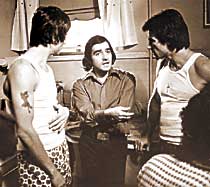Love her or hate her, the late Pauline
Kael was the only movie critic whose name could arouse genuine
emotion just from its utterance. And that’s only fitting, seeing
that Kael’s reviews were always emotional, heart-on-the-sleeve
affairs – what you saw was definitely what you got when you read
either a Kael paean or pan.
BAMCinematek begins its series, "Movie Love: A Tribute to
Pauline Kael" on Feb. 11. The series features 10 movies
championed by the astute, unapologetically populist critic during
her influential career at the New Yorker, which ran from 1968
until she retired in 1991. "Movie Love" will allow
viewers to see for themselves how this enormously talented writer
and analyst, who died last September at the age of 82, got it
right and wrong.
The series title comes from Kael’s last compilation of reviews,
"Movie Love" (E.P. Dutton, 1991). All of Kael’s book
titles have a sexual connotation to them: "Going Steady"
(Little, Brown and Co., 1970), "I Lost It at the Movies"
(Little, Brown and Co., 1965), "Kiss Kiss Bang Bang"
(Little, Brown and Co., 1968), etc. Undoubtedly, Kael equated
sitting in a darkened room with a bunch of strangers to erotic
pleasure, which, in a perverse way, it was.
Her writing often underlined that heightened, fulfilled response,
as is displayed in excerpts from her own writings on the films
programmed for this series. About "Intolerance" (1916),
D.W. Griffith’s still-stunning, three-hour study of how over
thousands of years, man’s inhumanity to his fellow man never
ends, Kael wrote, "It is charged with visionary excitement
about the power of movies to do alone what all the other arts
together had done." (The silent "Intolerance"
will be screened Feb. 11, accompanied by pianist Donald Sosin.)
About "Mean Streets," the 1973 drama that made Martin
Scorsese’s initial reputation before "Taxi Driver"
shot him into the stratosphere of American filmmaking, Kael raved
that it "has an unsettling, episodic rhythm and it’s dizzyingly
sensual." (Feb. 26 at 4:30, 6:50 and 9:10 pm)
And of "Night of the Shooting Stars," the Taviani brothers’
lyrical 1982 ode to their childhood during World War II, the
critic rhapsodized about its creators’ ability to share their
own experiences with the viewer. "It’s this teeming, fecund
mixture, fermenting in their heads for almost 40 years, that
produces the film’s giddy hallucinatory realism," Kael wrote.
(March 12 at 4:30, 6:50 and 9:10 pm)
Some of the movies in the BAM series show that Kael’s taste is,
well, her taste. No one will quibble with the relatively safe
choices of Renoir’s classic "The Rules of the Game"
(Feb. 12 at 4:30, 6:50 and 9:20 pm), Robert Altman’s kaleidoscopic
masterwork "Nashville" (Feb. 19 at 5 and 8:30 pm),
or Jonathan Demme’s modern, modestly scaled folktale "Melvin
& Howard" (Feb. 18 at 4:30, 6:50 and 9:30 pm; Demme
will introduce the 6:50 pm screening.)
But others are more dubious. Herbert Ross’ "Pennies from
Heaven" (March 4 at 4:30, 6:50 and 9:10 pm) is a failed
musical about failure, shot in black and white, that just misses
its mark; for Kael, however, it’s "something thrilling."
Irvin Kershner’s trite 1970 comic drama about a mid-life crisis,
"Loving" (Feb. 25 at 4:30, 6:50 and 9:10 pm) is extolled
as "a beautifully sustained piece of moviemaking,"
while Luchino Visconti’s overripe 1963 costume epic "The
Leopard" (March 5 at 7 pm) is called "a sweeping popular
epic, with obvious similarities to ’Gone with the Wind’ and with
an almost Chekhovian sensibility."
But it’s "Blow Out" by Brian de Palma (March 11 at
4:30, 6:50 and 9:10 pm) that shows Kael’s blind side: the critic
was always kind to de Palma, even bending over backwards for
such obvious duds like "Casualties of War" and "Body
Double." About "Blow Out," she ecstatically wrote
that "it has a dreamlike clarity and inevitability this
is the first film he has made about the things that really matter
to him."
What the "Movie Love" series proves is that movies
always mattered to Kael. Whether they were subtle foreign pictures
– although it should be noted that seven of the 10 features in
this series were directed by Americans – or shallow Hollywood
comedies, Kael could find redemption in any feature that in some
way engaged her or at least entertained her a bit.
And that’s what made Kael a critic who mattered, and who is still
worth reading today, more than a decade after her last column
was published – even if you don’t agree with Kael, you can’t
help but be awed by her genuine lifelong love of movies.
"Movie Love: A Tribute to Pauline
Kael" runs Feb. 11-March 12 at BAMCinematek (30 Lafayette
Ave. at Ashland Place). Tickets are $9. For schedule and times,
visit www.bam.org on the Web or call (718) 636-4100.

























